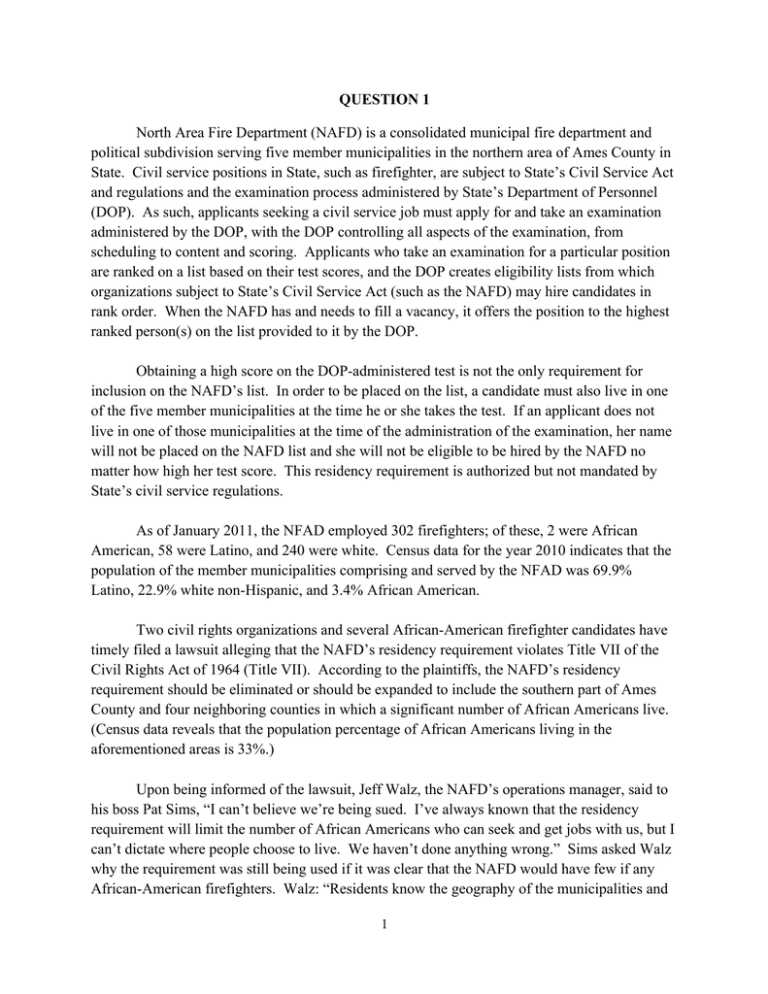QUESTION 1
advertisement

QUESTION 1 North Area Fire Department (NAFD) is a consolidated municipal fire department and political subdivision serving five member municipalities in the northern area of Ames County in State. Civil service positions in State, such as firefighter, are subject to State’s Civil Service Act and regulations and the examination process administered by State’s Department of Personnel (DOP). As such, applicants seeking a civil service job must apply for and take an examination administered by the DOP, with the DOP controlling all aspects of the examination, from scheduling to content and scoring. Applicants who take an examination for a particular position are ranked on a list based on their test scores, and the DOP creates eligibility lists from which organizations subject to State’s Civil Service Act (such as the NAFD) may hire candidates in rank order. When the NAFD has and needs to fill a vacancy, it offers the position to the highest ranked person(s) on the list provided to it by the DOP. Obtaining a high score on the DOP-administered test is not the only requirement for inclusion on the NAFD’s list. In order to be placed on the list, a candidate must also live in one of the five member municipalities at the time he or she takes the test. If an applicant does not live in one of those municipalities at the time of the administration of the examination, her name will not be placed on the NAFD list and she will not be eligible to be hired by the NAFD no matter how high her test score. This residency requirement is authorized but not mandated by State’s civil service regulations. As of January 2011, the NFAD employed 302 firefighters; of these, 2 were African American, 58 were Latino, and 240 were white. Census data for the year 2010 indicates that the population of the member municipalities comprising and served by the NFAD was 69.9% Latino, 22.9% white non-Hispanic, and 3.4% African American. Two civil rights organizations and several African-American firefighter candidates have timely filed a lawsuit alleging that the NAFD’s residency requirement violates Title VII of the Civil Rights Act of 1964 (Title VII). According to the plaintiffs, the NAFD’s residency requirement should be eliminated or should be expanded to include the southern part of Ames County and four neighboring counties in which a significant number of African Americans live. (Census data reveals that the population percentage of African Americans living in the aforementioned areas is 33%.) Upon being informed of the lawsuit, Jeff Walz, the NAFD’s operations manager, said to his boss Pat Sims, “I can’t believe we’re being sued. I’ve always known that the residency requirement will limit the number of African Americans who can seek and get jobs with us, but I can’t dictate where people choose to live. We haven’t done anything wrong.” Sims asked Walz why the requirement was still being used if it was clear that the NAFD would have few if any African-American firefighters. Walz: “Residents know the geography of the municipalities and 1 are familiar with the area. Firefighters who live close to work will have quicker response times in an emergency.” After speaking with Walz, Sims made a note to talk with the NAFD’s lawyer about another workplace issue. One of the NFAD’s African-American firefighters, Jeff Stone, recently filed a charge of race and age discrimination with the Equal Employment Opportunity Commission (EEOC). Stone contended that his supervisor, Bob Rock, routinely called Stone (and no one else) “Bubba” and used the term “you people” on three or four occasions when Stone did not come to work on time (“you people are always late”). Stone filed his charge with the EEOC two weeks after he was called to a meeting with Rock and was told that he was being suspended without pay and for an undetermined period of time because of his habitual tardiness. Stone said to Rock, “That’s not fair.” Rock responded, “Not fair? I should fire your butt, Bubba. You’re lucky to have a job, you’re pushing 55 right? Close to your pension, right? You people.” Stone, visibly angry, yelled, “I’m going to sue you!” “You’re threatening me? You want to turn that suspension into a discharge, Bubba?,” Rock asked. At that point Stone made physical contact with Rock (Stone contends that he inadvertently bumped Rock as he tried to leave Rock’s office; Rock asserts that Stone slapped him and pushed him against the wall.) Rock telephoned security and said that he had been assaulted by an employee and needed help. When two security officers arrived at his office Rock told Stone “You’re fired” and security escorted Stone out of the facility. On the same day of her father’s argument with Stone, Rock’s daughter Liz Rock submitted her resignation and left her job as an associate attorney at a local law firm. She was disgusted by and fed up with the behavior of a partner who, during a six-month period, routinely asked her to go on dates with him, asked her questions about her “sex life,” called her at home on weekends and asked her to meet him for a drink (she always said no), and grabbed her arm and kissed her at last year’s firm Christmas party. Liz Rock did not complain about the partner’s behavior prior to leaving her position. PLEASE ANSWER THE FOLLOWING QUESTION: You are a lawyer and employment discrimination law specialist. The NAFD and Liz Rock’s former law firm have retained you, have related the foregoing facts to you, and have asked you to identify any and all employment discrimination claims and causes of action (and defenses thereto) that could be brought against them, as well as their potential damages exposure. Please respond to and answer the NAFD’s and the law firm’s queries and advise your clients of areas of further factual and legal exploration and inquiry (if any). 2 QUESTION 2 Agree or disagree with the following proposition: “Being female is a bona fide occupational qualification for food server positions in the Hooters chain of restaurants.” 3




